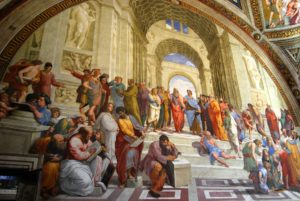 Aristotle is one of the best-known philosophers of Ancient Greece. He stands out as a thinker and polymath notable for his early contributions to fields ranging from analytical grammar to the nature of reality. The noted philosopher even exerted significant though indirect influence on the spread of Greek culture and thought abroad, as his most famous pupil was Alexander the Great.
Aristotle is one of the best-known philosophers of Ancient Greece. He stands out as a thinker and polymath notable for his early contributions to fields ranging from analytical grammar to the nature of reality. The noted philosopher even exerted significant though indirect influence on the spread of Greek culture and thought abroad, as his most famous pupil was Alexander the Great.
People could spend a lifetime studying his wisdom and not even scratch the surface. However, it is possible to get to know some of the basics. Following are some of the basic components of Aristotle’s thought and teachings:
Aristotelian View on the Nature of Reality
Aristotle put forward an idea of the nature of reality that was fundamentally in opposition to those proposed by his equally famous teacher, Plato. Plato believed that the nature of the universe could be viewed as a series of ideals existing outside of material reality. These so-called Platonic ideals could not be ascertained directly by human senses.
Instead, he viewed the material world as the result of the receiving of these ideals into matter, which he believed to be an imperfect medium that could never be entirely true to the ideal form of a thing.
Aristotle criticized this view, asserting instead that the human senses were fundamental to an understanding of a universe that he viewed in a more material sense. Aristotle viewed ideas and substance as being intertwined and rejected Plato’s notions that they were, in fact, two entirely different phenomena.
The views held by both Plato and Aristotle would remain relevant to the world of philosophy many centuries after both men had died. Indeed, the debate between Platonism and Aristotelianism would be an important feature in the theology of the Catholic church during the Middle Ages.
Contributions to Formal Logic
Among Aristotle’s greatest achievements were his contributions to formal logic. Using tools such as syllogisms and the square of opposition that has since borne his name, Aristotle was among the first thinkers to attempt to construct formal systems of reasoning by which truths could be discerned from universal and particular observations. Although Aristotle’s system of logic has since been challenged as incomplete, it is telling of his influence that elements of Aristotelian thought on the subject are still taught as part of the corpus of Western logic to this day.
Aristotle’s Ethics
Like many philosophers, Aristotle explored the notions of ethics and morality in an attempt to determine which human actions were truly good. To Aristotle, an act was good if it was in accordance with the notion of a virtue. In conjunction with this, Aristotle proposed a list of primary virtues, as well as their corresponding vices.
In his view, an action that was in accordance with one of these virtues was an act of good. A very similar view on ethics and morality was later expressed by the noted philosopher and Roman Emperor Marcus Aurelius.
Today, the writings of Aristotle continue to hold a uniquely important place in the canon of Western thought. In addition to his direct influence, Aristotle also inspired almost all subsequent philosophers, allowing ideas originally articulated by him to spread throughout the entire intellectual tradition of the West.
Source: